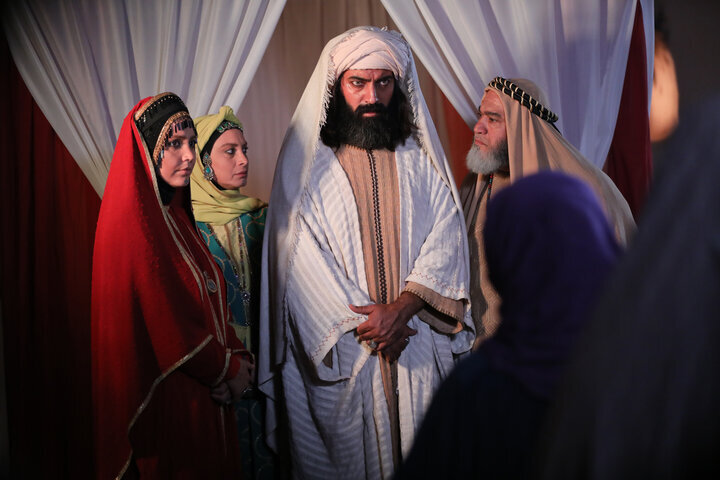Iranian Series “Kufi Love”, “The Supreme Scribe” airing on international channels during Muharram

TEHRAN – The acclaimed historical romantic Iranian series “Kufi Love” began airing daily at 10 PM on the Iraqi channel Al Iraqiya on Friday, coinciding with the first night of Muharram.
The series offers a compelling narrative set against the tumultuous events of 61 AH (680 CE), highlighting themes of love, loyalty, and sacrifice amid the chaos of early Islamic history, Mehr reported.
“Kufi Love” is directed by Hassan Akhundpour, with a screenplay penned collaboratively by Faezeh Yarmohammadi and Yazdan Mohammad-Kazemi. This Iranian television series immerses viewers in a dramatized retelling of pivotal events during the year 61 AH, a time marked by profound political and religious upheaval leading up to the Battle of Karbala.
The storyline centers around Hilal, a young archer from the Alawi family, whose heart is captured by Naila, a woman from the Ottoman lineage. Their love story unfolds amid the storm of events that shaped Kufa and Karbala, with their relationship transforming through the turbulent tides of political conspiracies and religious loyalties. The narrative begins with the arrival of Muslim ibn Aqil in Kufa and culminates in the tragic events of Ashura, illustrating how personal love intertwines with historical destiny.
The Owj Arts and Media Organization is the producer of “Kufi Love”, which features an ensemble cast including Laia Zangeneh, Nader Soleimani, Saeed Sharif, Shabnam Ghorbani, Hossein Soleimani, Sogol Tahmasebi, Nader Fallah, Mahsa Mahjour, Maryam Kaviani, and Seyyed Javad Hashemi.
Al Iraqiya, recognized as Iraq’s official state broadcaster and the second most-watched channel in the country after Al Sharqiya, has included “Kufi Love” in its Muharram lineup, aiming to connect Iraqi viewers with profound historical narratives during the holy month.
In addition to “Kufi Love,” another significant Iranian production titled “The Supreme Scribe” is also being broadcast to commemorate the events from the morning until the night of Ashura.
This series has been dubbed into Urdu and is available on the NegahTV platform in Pakistan.
Produced by the Soore Series Center and written and directed by Mehdi Ghafouri, “The Supreme Scribe” is a seven-part miniseries based on the book “Confessions of the Killed Scribe” by Sasan Nateq, published by Soore Mehr Publishing House.
It offers a dramatized account of events from the early hours of Ashura until the evening, focusing on the enemies’ perspective from their camp. The series features prominent actors such as Amin Zendegani, Siamak Safari, Nader Fallah, Nazanin Farahani, Fatemeh Goudarzi, Hadis Miramini, Khosro Shahraz, Amin Miri, Amir Hossein Hashemi, Amir Shahrabi, Mohsen Alikhani, Mohammad-Mohsen Shafiei, Arash Rahimi, Mohammad-Reza Tajik, Amir Tak-Fallah, and Vahid Reza Qenaatian.
Both series underscore the enduring significance of Islamic history and the sacrifices made during pivotal moments in early Islamic civilization. As the month of Muharram unfolds, these productions serve to deepen understanding and reflection among viewers, emphasizing themes of love, loyalty, and resistance in the face of adversity.
Ashura is one of the most dramatic and meaningful events in Islamic history. It commemorates the martyrdom of Imam Hussein (AS), the third Imam and the beloved grandson of Prophet Muhammad (PBUH), who was killed along with 72 of his loyal companions in the Battle of Karbala in 680 CE. This tragic event represents the ultimate stand against tyranny and injustice, as Imam Hussein (AS) and his small group of followers rose up against the oppressive Umayyad dynasty led by Yazid.
Imam Hussein (AS) refused to pledge allegiance to Yazid, whose rule he saw as corrupt and un-Islamic. Instead, he chose to stand for truth, justice, and righteousness, even though it meant sacrificing his life. His bravery and sacrifice became a symbol of resistance against oppression for generations to come.
Ashura holds deep cultural and religious significance, especially among Shia Muslims. Every year, on the 10th day of the Islamic month of Muharram, millions of people around the world commemorate this event with mourning ceremonies, processions, and reenactments of the battle. People wear black, recite elegies, and reflect on the values Imam Hussein (AS) stood for. In many cultures, food and water are distributed freely in remembrance of the thirst and suffering endured by Imam Hussein and his companions.
SAB/
Leave a Comment